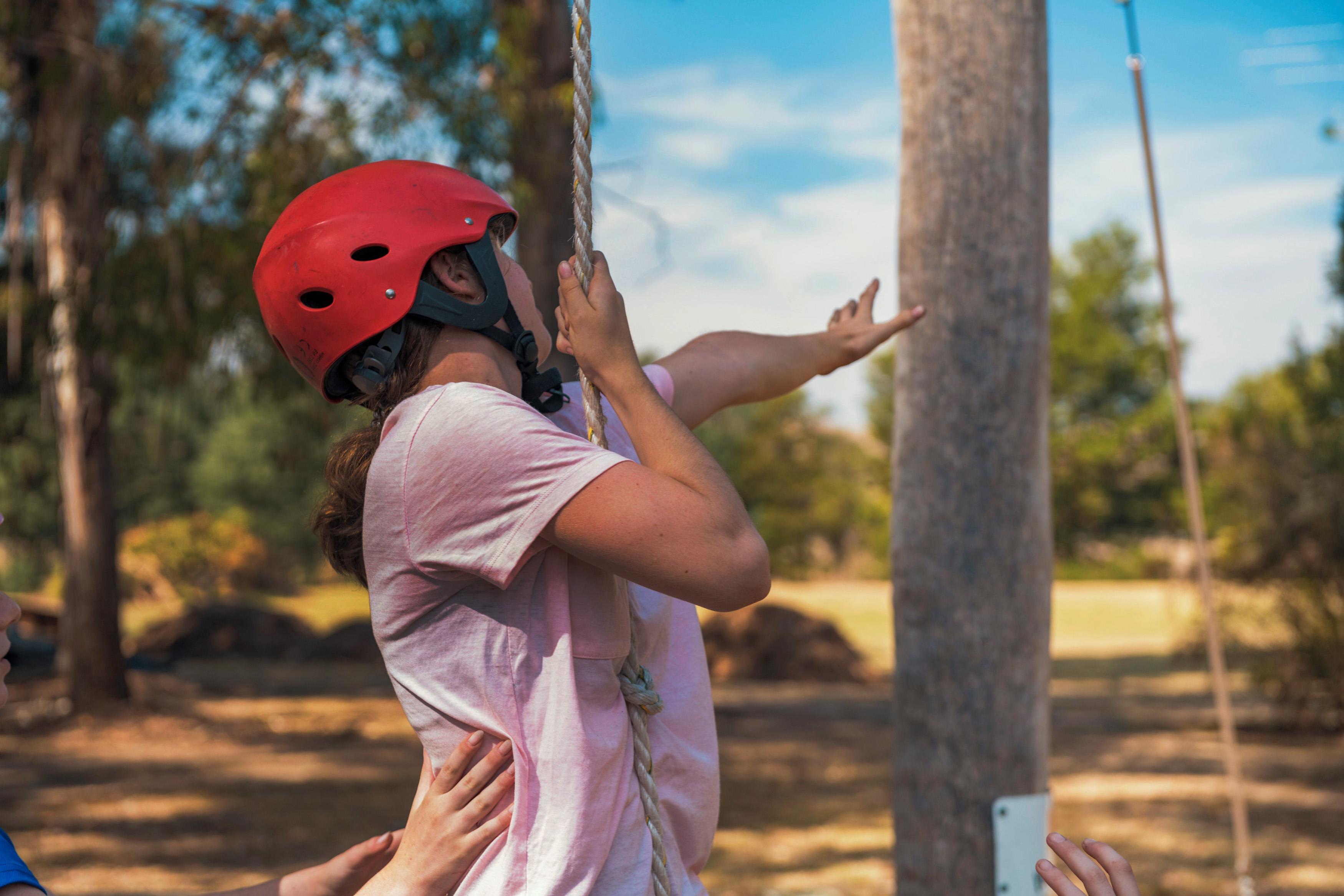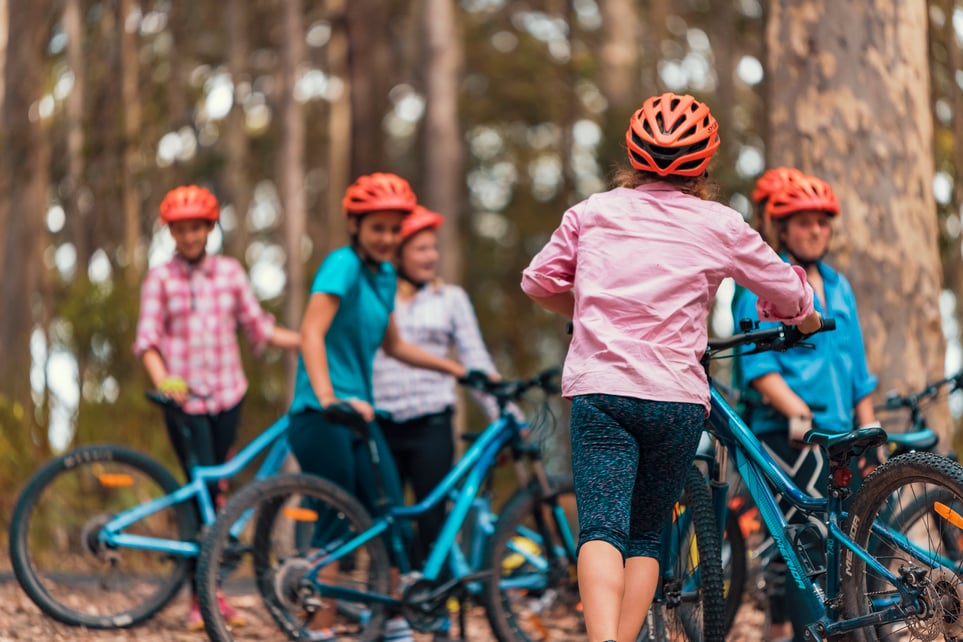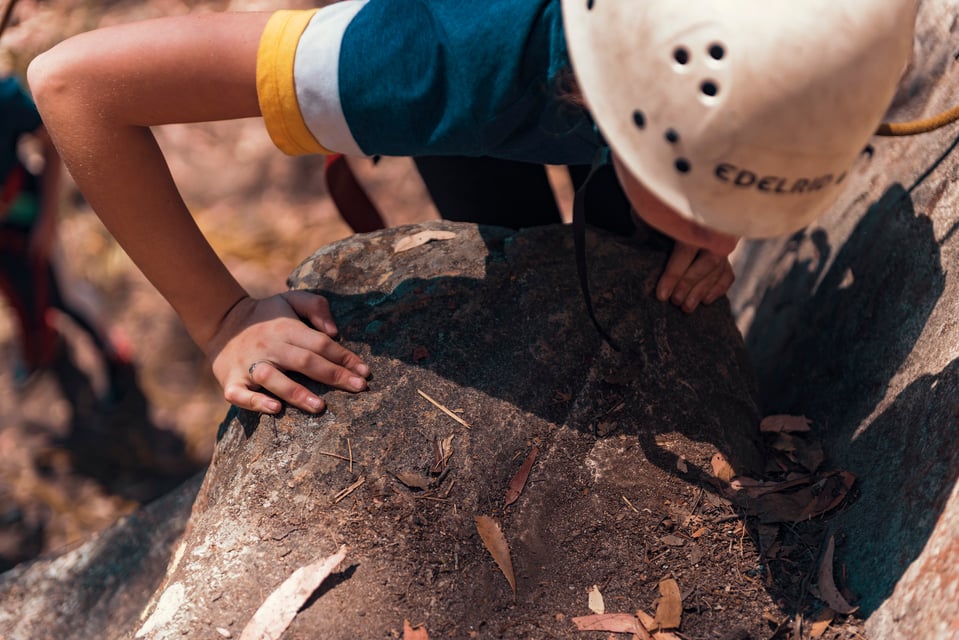Helping young Australians get real world ready
1800 888 900

Ioánna Lyssiotis
Young people are capable of remarkable things. They all have the potential for greatness within them, and it's up to us to support them in reaching their full potential. By encouraging the development of skills such as communication, problem-solving and emotional intelligence, children can face life's challenges with confidence.
Learning communities play a crucial role in developing the skills which underpin resilience through formal and informal learning opportunities, and the good news is, it's never too early or too late to start the journey.
WHAT IS RESILIENCE?
As they grow, children encounter stress and challenges. For example, conflicts may occur within friendships groups, in study, through bullying, and with issues of identity. They may also occur within family relationships. It's easy to see why in the eyes of a child, these obstacles feel all-consuming. In today's environment, young people need to develop strengths, acquire skills to cope, recover from hardships, and be prepared for future challenges. In order to thrive, they need to be resilient.
For professionals working with young people, resilience is not just about "bouncing back", it's about "bouncing forward." Resilience doesn't just mean returning to normality after facing a difficult situation; it means learning from the process to become a valuable member of a community.
WHY IS IT IMPORTANT FOR YOUNG PEOPLE?
When children have the skills and the confidence to confront and work through problems, they get to understand their own capacities to manage complex and challenging situations. Children who become resilient are inquisitive, brave, and trust their instincts. These children are more likely to take healthy risks because they don't fear falling short of expectations. Through resilience, they develop independence, efficient problem-solving skills and are better able to build and maintain interpersonal relationships. These characteristics enhance their self-esteem and their ability to perform and contribute meaningfully not only, to daily life but also to society, at large.
More than half of Australian students lack the skills needed to navigate life's challenges, with many citing depression, stress and a lack of confidence as the primary cause. A study of more than 1,600 students in Years 4 through to 12 by Resilient Youth Australia, a not-for-profit organisation promoting the mental health of young people, found a third of young females felt unhappy, depressed and lacking in confidence. One in three young males reported they were constantly under strain, while a quarter had issues with confidence.
Resilience contributes significantly to the overall wellbeing of a child; it is essential in preventing the onset of mental health problems as well as giving children the skills to understand and cope with existing mental health problems.
Consequently, resilience is at the heart of a young person's wellbeing and means the difference between just surviving or thriving.
RESILIENCE CAN BE TAUGHT
The skills which underpin resilience can be nurtured and strengthened at any age through the development of social skills. But teaching resilience goes beyond traditional learning methods. Interaction and engagement can shape the individual characteristics of a child by building their resilience.
Schools are uniquely positioned to foster positive development in their students.
Increasingly, promoting student wellbeing is an essential part of a school's core business. Schools can develop the learning of resilience by providing unique developmental opportunities such as outdoor education programs. Well designed, age-appropriate and health-promoting programs can significantly improve the overall wellbeing of a student - of any age.

BUILDING STUDENT RESILIENCE THROUGH OUTDOOR EDUCATION
Outdoor education experiences take learning outside the four walls of a traditional classroom and provide a place for students to learn, apply and reflect upon real-world situations. These skills, when practised in the outdoors, provide instant feedback, promote reflection and eventually lead back into their everyday life. When accepting challenges in the outdoors through a variety of adventure activities, students can work their way through problems in an actual, hands-on way.
Outdoor learning offers students the opportunity to learn about their strengths and limitations and how persistence in extending one's (often) self-imposed restrictions can bring success. Connecting students with the outdoors, by working in small communities and with their own physical and emotional challenges provide a rich environment for the development of personal and social growth.
Brendon Fogarty, National Head of Outdoor Curriculum at The Outdoor Education Group says, "Outdoor education programs that encourage students to take on personal challenges in the natural world, provide them with opportunities to build their resilience, learning how to deal with obstacles, success and failure. These programs also encourage students to work towards collaborative goal orientated outcomes. Social and emotional skills - such as confidence, self-discipline and coping skills - enable students to persist in the face of challenge, set higher academic goals and use more effective study practices."
Outdoor education provides real opportunities to improve learning by fully engaging students in outdoor activities which allow them to face obstacles and realise they are capable of more than they know.
Students work together in facilitated groups dealing directly with concepts such as responsibility, persistence, problem-solving, decision making, co-operation and independence.
For instance, during a bushwalking adventure, all students have not only their own responsibilities but also those towards the group. They must work together to master new skills and navigate their way. They learn to rely on themselves and each other as they discover how to orientate themselves, read a map, measure distance, consider time and plan their route together.
During canoeing, mountain biking or rock climbing students are empowered to set their own challenges, strategise and overcome their fears. They learn to support their peers, physically and emotionally, are encouraged to acknowledge errors and recognise the abilities of their peers as they push beyond their comfort zones.
The above social and emotional understandings and skills work to underpin personal resilience and wellbeing.
GROUP ACTIVITIES ENHANCE RESILIENCE
A study conducted by Victoria University PhD student Cassie-Anne Chalman confirms that resilience and wellbeing are enhanced through group activity and participation in extended outdoor education programs:
Schools who employ outdoor education programs can assist their students to develop their resilience capacity, developmental assets and coping skills. Instead of taking a reactive approach, schools can take a preventative approach to mental health promotion, by utilising outdoor education programs as an intervention to develop coping skills and their resilience capacity.
By providing opportunities for young people to be engaged in outdoor education programs, that explicitly aim to develop their resilience capacity and repertoire of effective coping skills, schools can continuously support their students to transfer their learnings and integrate these skills into various life contexts.

RESILIENCE IN THE CLASSROOM
Resilience has positive effects on academic learning outcomes.
Bonnie Benard, of the University of Minnesota's National Resilience Resource Center, whose synthesis of resilience research highlights the following individual-level characteristics and skills as being linked to resilience:
- Higher levels of social competence: students can interact better with others and communicate more effectively.
- Problem-solving skills: students deal better with challenge, change and adversity.
- Sense of autonomy or self-efficacy: students develop a sense of independence, responsibility and confidence in their own capacity.
- A sense of purpose, hope or meaning: students have a sense of optimism about their future and a belief in the meaning and purpose of what they do and how that will contribute beyond the present.
In a classroom setting, these qualities support student engagement: when students are resilient, they are adaptable; capable of showing initiative; confident; responsible; empathetic toward others and can better manage their own emotions and behaviours.
The National Declaration of the Educational Goals for Young Australians points to the importance of personal and social skills for students to become successful learners and to help them improve their academic learning, as well as enhancing their motivation to reach their full potential. In line with this, the Australian Curriculum emphasises the need for students to develop their personal and social capabilities as they learn to understand themselves and manage their relationships more effectively with others.
A resilient student-body creates a robust and healthy school culture.
Outdoor education programs build connectedness among peers and can lead to an increase in positive student-teacher relationships. School connectedness is also associated with a range of physical and mental health outcomes. A sense of connectedness to school is an important protective shield for young people and contributes to building their resilience and sense of identity. This, in turn, supports positive health and better academic outcomes. Young people who feel cared for within their school communities are more likely to be motivated, show improved academic self-efficacy.
RESILIENCE BEYOND THE CLASSROOM
Resilience doesn't just support children with the difficulties they are bound to face as part of everyday life; it also supports the necessary skills and habits they need to acquire in order to help them deal with pressures in adulthood.
In his Psychology Today blog Declining Student Resilience: A Serious Problem for Colleges, renowned educator Dr Peter Gray points out students are increasingly experiencing emotional crises over problems thrown up by everyday life, such as conflicts or receiving bad grades. According to Gray, a lack of student resilience is interfering with the academic mission of colleges and universities. One of the most frequently cited offenders implicated in diminishing student resilience is an overly rigid K-12 education system that arrests normal child development and infantilises young adults. As a result, Gray argues, young adults are not given the opportunity to learn how to solve their own problems.
By developing resilience in students, schools can prepare them for life's challenges; they have the ability to empower them to strive for long-term goals with confidence and determination. Resilient young people grow up to be responsible and committed community members.
A partnership between schools and a proven organisation such as The Outdoor Education Group can help build resilience which, in turn, gives young people the potential for greatness, both short and long-term. The Outdoor Education Group provide opportunities for your students to build resilience through a variety of dynamic outdoor education programs; from incursions, camps, journeys to sequential programs.
Resilience is vital for children's mental health; it makes them stronger, healthier and better at tackling the challenges. Through powerful and authentic learning experiences, outdoor education can clear a pathway for students to learn resilience as a skill which they can carry with them into the future.
READ ON
SCHOOL CAMPS ORGANISED BY THE EXPERTS
Ioánna Lyssiotis
INCREASE STUDENT WELLBEING WITH OUTDOOR EDUCATION INCURSIONS
Ioánna Lyssiotis
HOW WE CREATE AN ENVIRONMENT OF EMOTIONAL SAFETY WITHIN OEG PROGRAMS
Bek Agius
